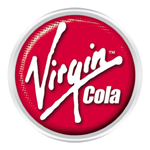History
Virgin Cola was set up during the early 1990s in conjunction with Cott, an American-Canadian company that specialises in bottling own-label drinks. Cott was looking for a major international brand that could have worldwide appeal. Virgin Group founder, Richard Branson was looking to widen the Virgin name and to rival the Coca-Cola and Pepsi brands.
Virgin Cola began to hit international shores within its first year. The UK first served the drink on Virgin Atlantic flights, on-board shops on Virgin Trains and also at Virgin Cinemas. The Gulliver's Kingdom chain of theme parks in the UK also sold post-mix Virgin Cola. This led Virgin Cola to agree a distribution deal with British supermarket retailer Tesco in 1994. [1]
A promotional blimp can be seen saving a woman’s life on the show Baywatch , in the episode “The Runaways”, first aired in the U.S. on May 20, 1995. The episode features Richard Branson heavily.
From 1996, the 500ml bottles were marketed as "The Pammy", as their curves were designed to resemble Pamela Anderson who was at the height of her popularity in the UK at the time. [2] [3] It went on to be launched in France, Belgium and South Africa. [4]
In 2002, a vanilla cola called Virgin Vanilla was launched in the UK by Princes Soft Drinks, ahead of the launch of a similar product from rival Coca-Cola. [5]
On March 2004, Princes Soft Drinks announced that Virgin Cola would undergo a relaunch to focus on the teenage market, while at the same time discontinuing the Vanilla and Caffeine Free varieties. [6]
US release
In 1998, Branson attended the USA launch of Virgin Cola driving a T-54/55 tank into New York City's Times Square. [7] [8] It subsequently agreed distribution channels with US retailers such as Target. [8] Virgin Drinks USA, the company dealing in Virgin Cola's US market, closed in April 2001, having managed to establish just a 0.5% share of the market by volume. [9]
A bottle of Virgin Cola can be seen on the coffee table in Monica and Rachel's apartment in the Friends episode "The One with Joey's Bag" that first aired in the U.S. on 4 February 1999. Branson had previously appeared in an episode and was said to be a fan of the show. A can of Virgin Cola appears in Ally McBeal in the title character's refrigerator in the episode "Love Unlimited", first aired on 18 January 1999. In season 4 episode 10 of Buffy the Vampire Slayer ("The Hush"), Willow is seen drinking a can of Virgin Cola in a scene with Buffy.
Decline
“We had a great brand. But Coke had a great brand. The taste of the Cola was maybe marginally better, but it was neither here nor there. So since then what I learned from that was only to go into businesses where we were palpably better than all the competition.”
—Branson's retrospective on Virgin Cola. [10]
According to Branson, a campaign was run by The Coca-Cola Company against Virgin Cola. [11] Originally Coca-Cola did not treat Virgin as a serious competitor, but when Virgin started outselling Coke in the United Kingdom and entered the American market, Coke realised it needed to do something. At the suggestion of a British Coca-Cola executive, Coke assembled teams for an influencing campaign. [12] Its intent was to make deals with retailers that sold Coke and Virgin Cola to get Virgin Cola removed from the shelves. [13] Branson admitted Virgin did not know this was going on and it eventually led to a drop in sales. [14] Branson did become aware that the drink had become discontinued in Tesco, the UK's biggest supermarket. [15] Later the Coke executive would work for Lloyds TSB and would become the manager of Virgin Group's bank accounts to which Branson, when he found out from her at a dinner, said "I wasn't sure whether to strangle her or not" but forgave her for it. [14] [16]
By 2007, the Virgin Cola business had reached a limited capacity in the UK, with its distribution license being taken over by Silver Spring in August. In July 2008, the brand announced that it would be relaunched with a product placement deal secured with Channel 4 to promote the drink on its music programme T-Mobile Transmission. [17] [18] However, the planned relaunch never came into fruition after Asda, the last major supplier of the drink, removed it from their shelves in August 2009 due to poor sales. Silver Spring would eventually collapse into administration. [19]
In 2014, Global Beverage Company Limited, the final international licensee for Virgin Cola, based in Bangladesh, stopped producing the beverage, leading to its total demise. [20] Branson claimed he decided to pull the plug after seeing that Bangladesh was the only remaining success. [21]
This page is based on this
Wikipedia article Text is available under the
CC BY-SA 4.0 license; additional terms may apply.
Images, videos and audio are available under their respective licenses.
